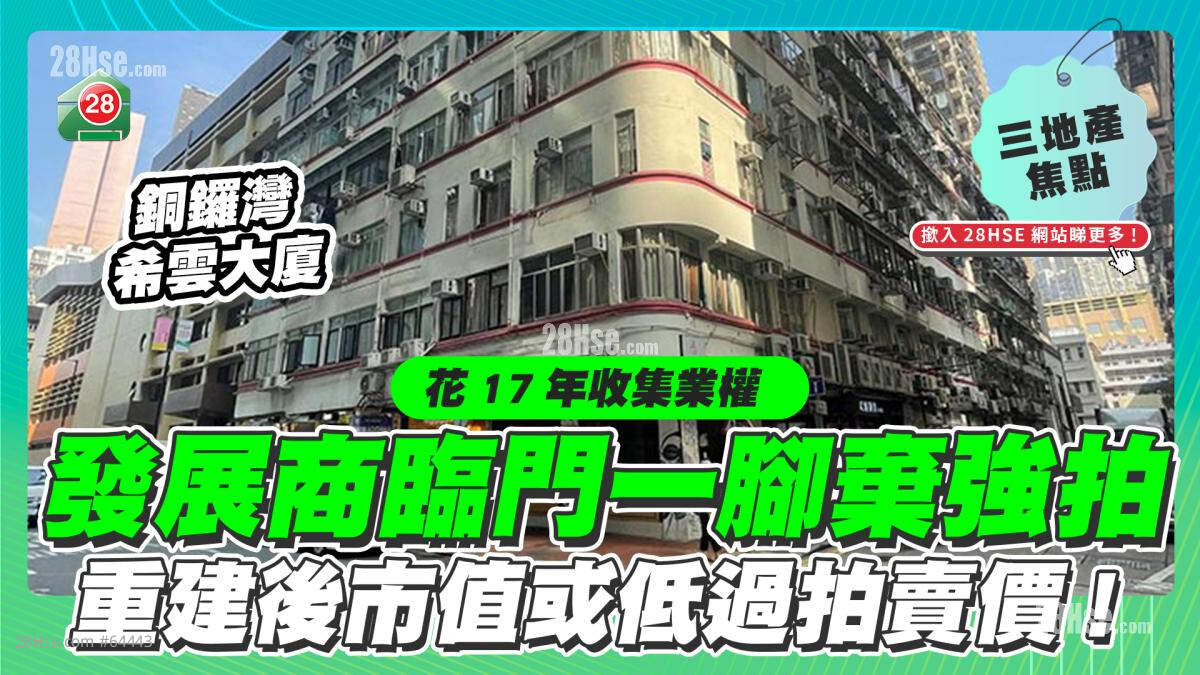After repeated failures to sell land last year, even the compulsory auction of old buildings – a strategy long pursued by developers – has recently resulted in an auction with no bids (“no-sale”). With the scarce supply of new land in the core business districts of Hong Kong Island, many are speculating about why developers would abandon compulsory auctions.
The most recent example is that of Haven Court in Causeway Bay, located at 128-138 Leighton Road and 2-30 Haven Street, covering an area of 13,150 square feet. This 11-story mixed-use building was completed in 1959; it features commercial spaces on the ground floor and higher levels, with residential units from the first to the tenth floors.
The project consists of 125 residential units and 44 retail shops. Soundwill Holdings, who had already owned 84.04% of the undivided shares of the property in 2019 when they applied for the compulsory auction, saw their share increase to 88.79% by April this year.
JLL conducted the public auction under compulsory auction regulations with a reserve price of HK$2.425 billion. However, the real estate group that applied for the auction did not send representatives to bid, and the property was withdrawn due to the lack of offers, resulting in a failed auction.
The developer had spent 17 years accumulating ownership shares, with about 19 units remaining unacquired. What factors led the developer to give up at the last moment? Soundwill Holdings explained that after careful consideration of the current economic conditions and real estate market in Hong Kong, they anticipated a possible decline in property value.
Additionally, an appraisal report by the surveying firm Vigers, dated February 29, estimated the post-reconstruction market value of the entire Haven Court property at about HK$2.1 billion. This figure is about 13.4% lower than the reserve price of HK$2.425 billion, which likely explains the lack of bidders.
This is the official version released, but for this largest "no-sale" case in Hong Kong's history, the market has various speculations. Some believe that the developer faced cash flow issues, as they would need to complete the reconstruction within six years after unifying ownership, or face penalties.
During the reconstruction, the developer would have to invest significant construction costs, with high expenses until completion could start to recoup funds, potentially leading to a shortfall. Hence, the developer chose to abandon the auction due to market risks.
Another widely believed reason is that the Lands Tribunal set a high reserve price to protect small property owners, prompting the developer to abstain from bidding to pressure the tribunal to adjust the reserve price.
Indeed, this could be a core reason, as after the event, Soundwill Holdings applied to the Lands Tribunal for an additional three months, from May 29 to August 29, to hold a further auction and requested a lower reserve price to align with the current market value of the plot.
Ultimately, the Lands Tribunal decided to extend the compulsory auction deadline by an additional three months, from May 29 to August 29, but the reserve price remained unchanged at HK$2.425 billion. In response, Soundwill Holdings indicated that there was no need to proceed with a further auction and is considering the possibility of appealing the decision made by the Land Tribunal.
It remains to be seen whether the Lands Tribunal will yield, but even if the compulsory auction ultimately fails, the developer can continue to acquire the remaining properties through the market. Property owners might accept the developer's original offer due to the failed auction, allowing the developer to save money.
Like

